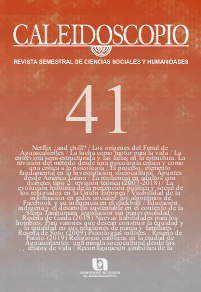The semi-structured interview and the faults in the structure. Reviewing the method from the point of view of critical psychology and as a critique to psychology
DOI:
https://doi.org/10.33064/41crscsh1203Keywords:
semi-structured interview, critic psychology, Lacanian Marxism, method, techniqueAbstract
The following work aims to discuss the scope, limitations, necessities and opportunities in the application of the semi- structured interview. To achieve this, we use the interview itself as a way of approaching the experiences, conceptions and perspectives of David Pavón-Cuéllar, a psychologist and philosopher of Marxist-Lacanian critical school. Through the interview and with the information obtained, concepts such as method, technique, theory and psychology are discussed, considered and problematized, to finally raise the possibility of a psychological and social research practice differentiated from the hegemonic one.
Downloads
References
Althusser, L. (1968). La filosofía como arma de la revolución. Madrid: Siglo XXI.
Briggs, C. (1986). Learning How to Ask: A Sociolinguistic Appraisal of the Role of the Interview in Social Science Research. New York: Cambridge University Press.
Elejabarrieta, F. (1997). El método lingüístico: técnicas de obtención de información. Barcelona: Universitat Autònoma de Barcelona.
Pavón-Cuéllar, D. (2014a). Del método crítico-teórico lacaniano a sus reconfiguraciones práctico-políticas en discursos concretos: cuestionamiento de la ideología, compromiso del investigador y subversión del sujeto. En J. M. Flores Osorio y J. L. Aparicio López (Eds.), Miradas y prácticas de la investigación psicológica y social (pp. 129-174). Puebla: BUAP.
Pavón-Cuéllar, D. (2014b). ¿Cómo servirse de la teoría lacaniana sin dejar de ser marxista? Ciências Sociais Unisinos, 50(2), 146-152. Recuperado de http://revistas.unisinos.br/index.php/ciencias_sociais/article/download/csu.2014.50.2.06/4266
Pavón-Cuéllar, D. (2014c). Elementos políticos de marxismo lacaniano. Ciudad de México: Paradiso.
Pavón-Cuéllar, D. (2015). Althusserian materialist dialectic in Lacanian discourse analysis: Universal exception, complex over- determination and critique of psychological discursive ideology. En J. Cresswell, A. Haye, A. Larraín, M. Morgan y G. Sullivan (Eds.), Dialogue and Debate in the Making of Theoretical Psychology (pp. 414-424). Concord: Captus.
Pavón-Cuéllar, D. (2016). Metapsychology on the Battlefield: Political Praxis as Critique of the Psychological Essence of Ideology. En S. Tomšič y A. Zevnik (Eds.), Jacques Lacan: Between Psychoanalysis and Politics (pp. 268-281). Nueva York: Routledge.
Pavón-Cuéllar, D. (2017a). The Language of History and its Immanent Critique: From Lacanian Discourse Analysis to Marxist Revolutionary Practice. Annual Review of Critical Psychology, 13, 1-13. Recuperado de https://thediscourseunit.files.wordpress.com/2017/08/arcpdavidp.pdf
Pavón-Cuéllar, D. (2017b). Psicología y destrucción del psiquismo: La utilización profesional del conocimiento psicológico para la tortura de presos políticos. Psicologia: Ciência e Profissão, 37 (núm. esp.), 11-27. doi:10.1590/1982-3703010002017
Potter, J. y Hepburn, A. (2012). Eight challenges for interview researchers. En J. F. Gubrium, J. A. Holstein, A. B. Marvasti y K. D. McKinney (Eds.), The Sage Handbook of Interview Research: The Complexity of the Craft (pp. 555-570). Thousand Oaks: Sage.
Published
How to Cite
Issue
Section
License
Licencia Creative Commons Atribución-NoComercial-CompartirIgual 4.0 Internacional
El lector es libre de compartir o adaptar el material en cualquier medio o formato bajo las condiciones siguientes: (a) debe reconocer adecuadamente la autoría, proporcionar un enlace a la licencia e indicar si se han realizado cambios; (b) no puede utilizar el material para una finalidad comercial y (c) si remezcla, transforma o crea a partir del material, deberá difundir sus contribuciones bajo la misma licencia que el original.
Resumen de la licencia
https://creativecommons.org/licenses/by-nc-sa/4.0/deed.es_ES
Texto completo de la licencia
https://creativecommons.org/licenses/by-nc-sa/4.0/legalcode
Cada autor es responsable del contenido de su artículo. En el caso de un texto colectivo, el primer autor asume la responsabilidad intelectual de los resultados del proceso editorial; los autores son responsables de obtener la licencia de autor para reproducir materiales gráficos o fotográficos que pertenecen a terceros.
Los autores asumen plena responsabilidad en el caso de falsificación de datos o falta de autenticidad en la investigación. Se comprometen, también, a no reutilizar trabajos ya publicados, total o parcialmente, para presentarlos en otra publicación.
Estas condiciones aplican tanto a la versión impresa como a la versión electrónica de la revista.


















